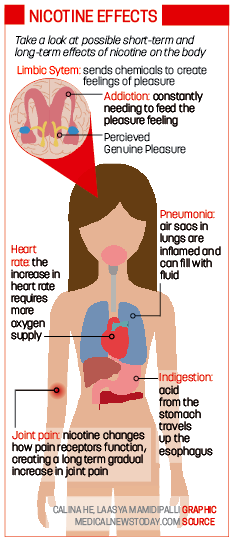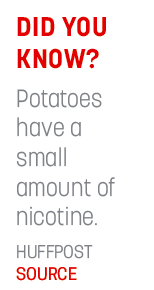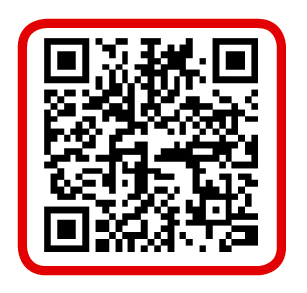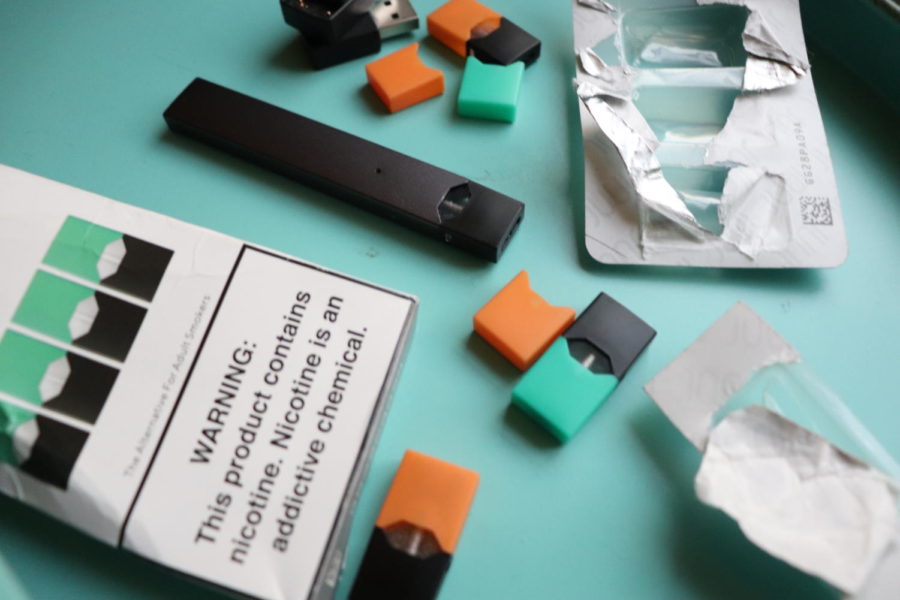On Sept. 6, rapper and singer Mac Miller tweeted about his concert tour, set to kick off on Oct. 27. In less than 24 hours from the time of that tweet, Miller would be dead from a suspected drug overdose at the age of 26.
For sophomore Nishita Prasad, while Miller’s death did not have a direct impact on her, she said it gave her further exposure regarding the dangers of drug use.
“This incident didn’t really change my mind about drug use because I was already pretty against it, but it helped boost my opinion of it,” Prasad said. “I don’t think drug use is good in any way except maybe for medical purposes, and his incident in particular showed how quickly drug use can take you from being a happy person to being dead or injured.”

Though Miller’s untimely death shocked many, the reality is that he is one out of thousands of Americans who have died from drug overdoses this year. Last year, according to the Centers for Disease Control and Prevention (CDC), Indiana reached an all-time high with an increase by 18 percent from 2016; 1,840 people in Indiana died of overdoses in 2017. Moreover, drug overdose deaths have increased on the national scale. According to the National Institute on Drug Abuse (NIDA), drug overdose deaths increased from 63,632 in 2016 to 72,306 in 2017. Though the increase in overdoses is alarming, high school drug use in the United States has declined in recent years, according to the NIDA.
Health teacher Derek Moser said in CHS health classes, drug use is one of the main topics in the curriculum.
“Having this drug education follow students into their adult life so that they can make better decisions is our goal,” Moser said. “Everyone is making decisions on their own, so you can’t control that, but our goal is that we can help build individuals that make healthy decisions now and continue doing that throughout their life.”
For Prasad, drug education has cemented her strong position against drugs. Drug awareness events like Red Ribbon Week, which will continue until Oct. 31, have also helped.
Besides education and awareness, school resource officers (SROs) also play an important role in preventing drug use by the thousands of students at CHS. According to Sgt. D.J. Schoeff, the prevention of drugs is a top priority for the SROs.
“Drug use of any kind is a huge issue, and it’s something we pay close attention to on a regular basis. How often we find drug use or get reports or anything of that nature varies, but our vision is out there because we know that drugs are not healthy for our kids,” Schoeff said.
Schoeff said he believes that any type of drug use at this school would be considered a major problem because of the dramatic impact it has on the students as a whole. He said drugs not only affect the person using it, but also others who interact with that student.
“In an academic environment, it’s a disruption because it affects not only the person using the drug but also the people around… You also have a disruption when a student chooses to talk to their friends about how they’re using drugs, or if they’re trying to sell drugs to other people,” Schoeff said.
Despite drug prevention efforts, recently an e-cigarette, JUUL, has become popular among adolescents.
JUULs are marketed as a “safer” alternative to cigarettes, but according to Moser, they can be just as harmful.
“One JUUL pod is equivalent to a whole pack of cigarettes, and, obviously, that’s a lot,” Moser said. “I would consider JUULing a gateway drug, but I think kids view it as, ‘Oh, I’m just JUULing, and it’s not that big of a deal.’ Once you use one type of drug, it’s easier to say yes to other drugs.”

Schoeff also said JUULing can be extremely harmful.
“I know that some of our kids don’t think that a JUUL is considered a drug, and they would consider that to be harmless and not a problem. Studies are becoming pretty clear that that’s not true, and JUULs are a major issue,” Schoeff said. “It’s considered possession of tobacco by a minor, regardless of what part of it that you have.”
As a student, Prasad also considers a JUUL to be a drug.
“Even if JUULs are stereotypically better than cigarettes, I think (it) is just a gateway to using drugs in the future. If you’re complacent with JUULing, then I think it’s just one step away from doing worse drugs,” Prasad said.
Though a complete stop to drug use in high schools is unlikely anytime soon, CHS is working toward that goal. Schoeff said one of his main goals is to create a culture within the student body.
“(The officers at CHS) only have a small collection of eyes and ears as a unit,” Schoeff said. “The reality is, the officers are not as good as the students. The students are much better at being able to provide information and help establish a culture that says that drug use is not acceptable. No matter how hard we work, that has to come from the student culture.”
Prasad she says building strong positive relationships with classmates is extremely important in abstaining from drug use and her helped her keep away from bad decisions in a supportive manner.
“Making healthy relationships with people who are mentally healthy and don’t abuse drugs can be very helpful,” Prasad said. “It’s good to have someone holding you accountable.”
That culture, according to Schoeff, is key in preventing drug use. “As a culture in our school,” he said, “what I would like our students to do is to help one another out.”
































![What happened to theater etiquette? [opinion]](https://hilite.org/wp-content/uploads/2025/04/Entertainment-Perspective-Cover-1200x471.jpg)













































![Review: “The Immortal Soul Salvage Yard:” A criminally underrated poetry collection [MUSE]](https://hilite.org/wp-content/uploads/2025/03/71cju6TvqmL._AC_UF10001000_QL80_.jpg)
![Review: "Dog Man" is Unapologetically Chaotic [MUSE]](https://hilite.org/wp-content/uploads/2025/03/dogman-1200x700.jpg)
![Review: "Ne Zha 2": The WeChat family reunion I didn’t know I needed [MUSE]](https://hilite.org/wp-content/uploads/2025/03/unnamed-4.png)
![Review in Print: Maripaz Villar brings a delightfully unique style to the world of WEBTOON [MUSE]](https://hilite.org/wp-content/uploads/2023/12/maripazcover-1200x960.jpg)
![Review: “The Sword of Kaigen” is a masterpiece [MUSE]](https://hilite.org/wp-content/uploads/2023/11/Screenshot-2023-11-26-201051.png)
![Review: Gateron Oil Kings, great linear switches, okay price [MUSE]](https://hilite.org/wp-content/uploads/2023/11/Screenshot-2023-11-26-200553.png)
![Review: “A Haunting in Venice” is a significant improvement from other Agatha Christie adaptations [MUSE]](https://hilite.org/wp-content/uploads/2023/11/e7ee2938a6d422669771bce6d8088521.jpg)
![Review: A Thanksgiving story from elementary school, still just as interesting [MUSE]](https://hilite.org/wp-content/uploads/2023/11/Screenshot-2023-11-26-195514-987x1200.png)
![Review: "When I Fly Towards You", cute, uplifting youth drama [MUSE]](https://hilite.org/wp-content/uploads/2023/09/When-I-Fly-Towards-You-Chinese-drama.png)
![Postcards from Muse: Hawaii Travel Diary [MUSE]](https://hilite.org/wp-content/uploads/2023/09/My-project-1-1200x1200.jpg)
![Review: "Ladybug & Cat Noir: The Movie," departure from original show [MUSE]](https://hilite.org/wp-content/uploads/2023/09/Ladybug__Cat_Noir_-_The_Movie_poster.jpg)
![Review in Print: "Hidden Love" is the cute, uplifting drama everyone needs [MUSE]](https://hilite.org/wp-content/uploads/2023/09/hiddenlovecover-e1693597208225-1030x1200.png)
![Review in Print: "Heartstopper" is the heartwarming queer romance we all need [MUSE]](https://hilite.org/wp-content/uploads/2023/08/museheartstoppercover-1200x654.png)



